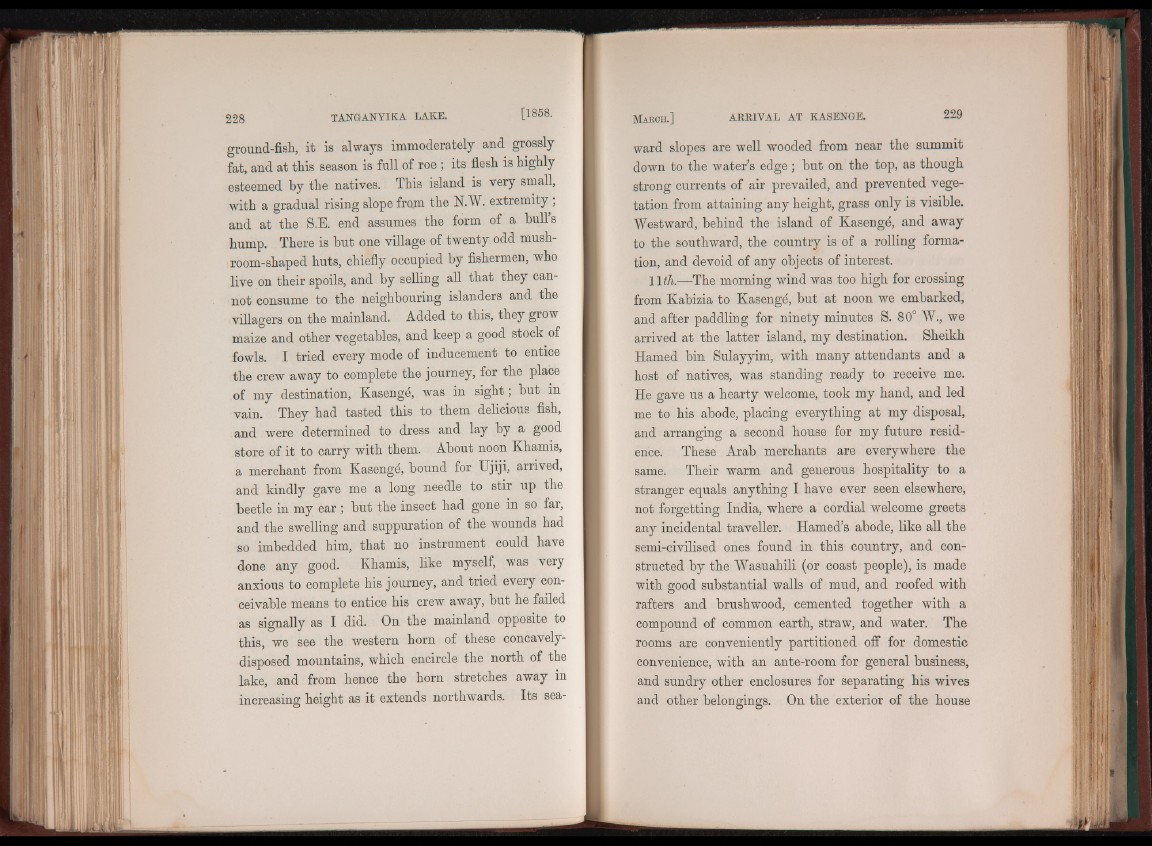
ground-fish, it is always immoderately and grossly
fat, and at this season is full of roe ; its flesh is highly
esteemed by the natives. This island is very small,
with a gradual rising slope from the N.W. extremity ;
and at the S.E. end assumes the form of a bull’s
hump. There is but one village of twenty, odd mushroom
shaped huts, chiefly occupied by fishermen, who
live on their spoils, and by selling all that they cannot
consume to the neighbouring islanders and the
villagers on the mainland. Added to this, they grow
maize and other vegetables, and keep a good stock of
fowls. I tried every mode of inducement to entice
the crew away to complete the journey, for the place
of my destination, Kasenge, was in sight; but in
vain. They had tasted this to them delicious fish,
and were determined to dress and lay by a good
store of it to carry with them. About noon Khamis,
a merchant from Kasenge, bound for Ujiji, arrived,
and kindly gave me a long needle to stir up the
beetle in my ear ; but the insect had gone in so far,
and the swelling and suppuration of the wounds had
so imbedded him, that no instrument could have
done any good. Khamis, like myself, was very
anxious to complete his journey, and tried every conceivable
means to entice his crew away, but he failed
as signally as I did. On the mainland opposite to
this, we see the western horn of these concavely-
disposed mountains, which encircle the north of the
lake, and from hence the horn stretches away in
increasing height as it extends northwards. Its seaward
slopes are well wooded from near the summit
down to the water’s edge; but on the top, as though
strong currents of air prevailed, and prevented vegetation
from attaining any height, grass only is visible.
Westward, behind the island of Kasengd, and away
to the southward, the country is of a rolling formation,
and devoid of any objects of interest.
IliA—The morning wind was too high for crossing
from Kabizia to Kasenge, but at noon we embarked,
and after paddling for ninety minutes S. 80° W., we
arrived at the latter island, my destination. Sheikh
Hamed bin Sulayyim, with many attendants and a
host of natives, was standing ready to receive me.
He gave us a hearty welcome, took my hand, and led
me to his abode, placing everything at my disposal,
and arranging a second house for my future residence.
These Arab merchants are everywhere the
same. Their warm and generous hospitality to a
stranger equals anything I have ever seen elsewhere,
not forgetting India, where a cordial welcome greets
any incidental traveller. Hamed’s abode, like all the
semi-civilised ones found in this country, and constructed
by the Wasuahili (or coast people), is made
with good substantial walls of mud, and roofed with
rafters and brushwood, cemented together with a
compound of common earth, straw, and water. The
rooms are conveniently partitioned off for domestic
convenience, with an ante-room for general business,
and sundry other enclosures for separating his wives
and other belongings. On the exterior of the house